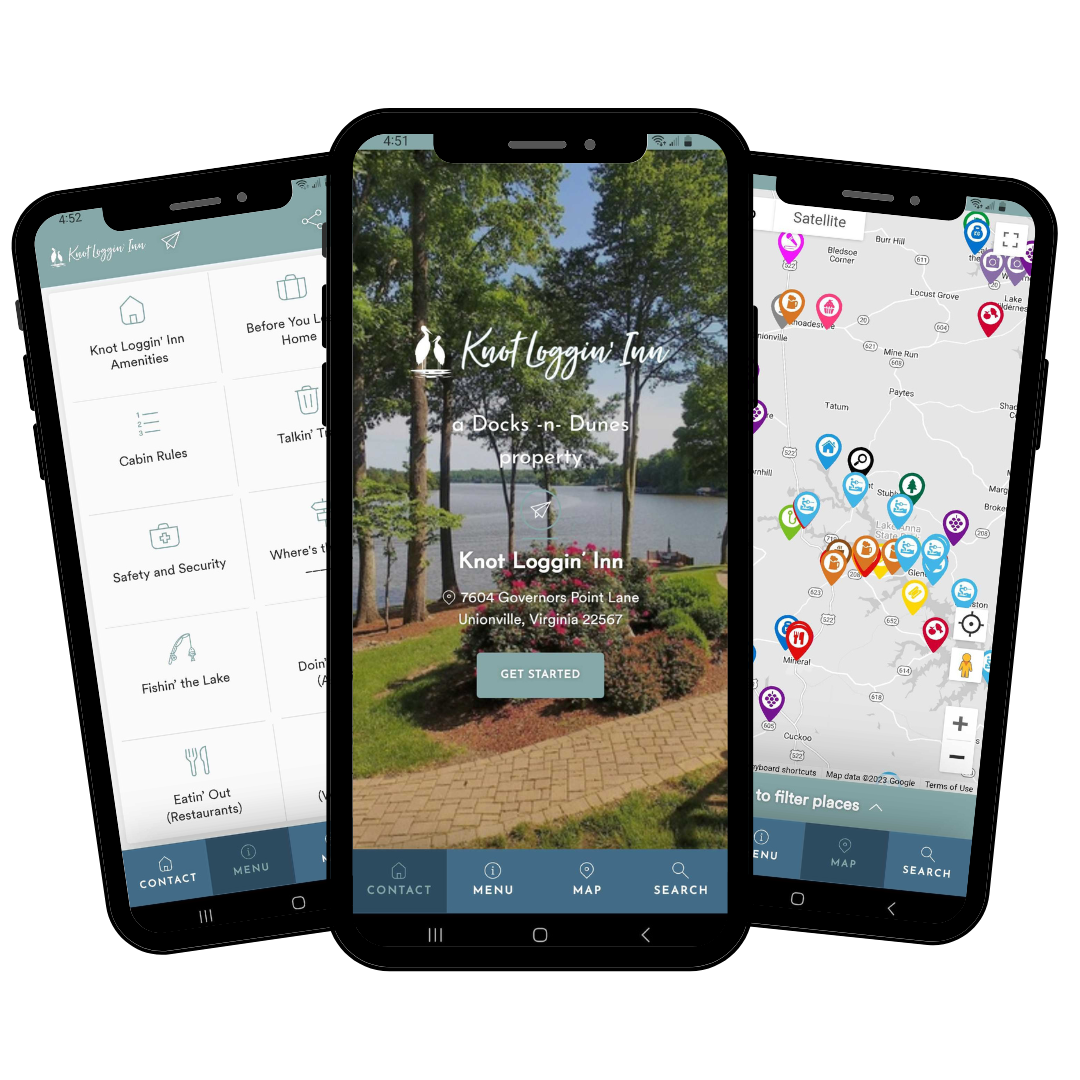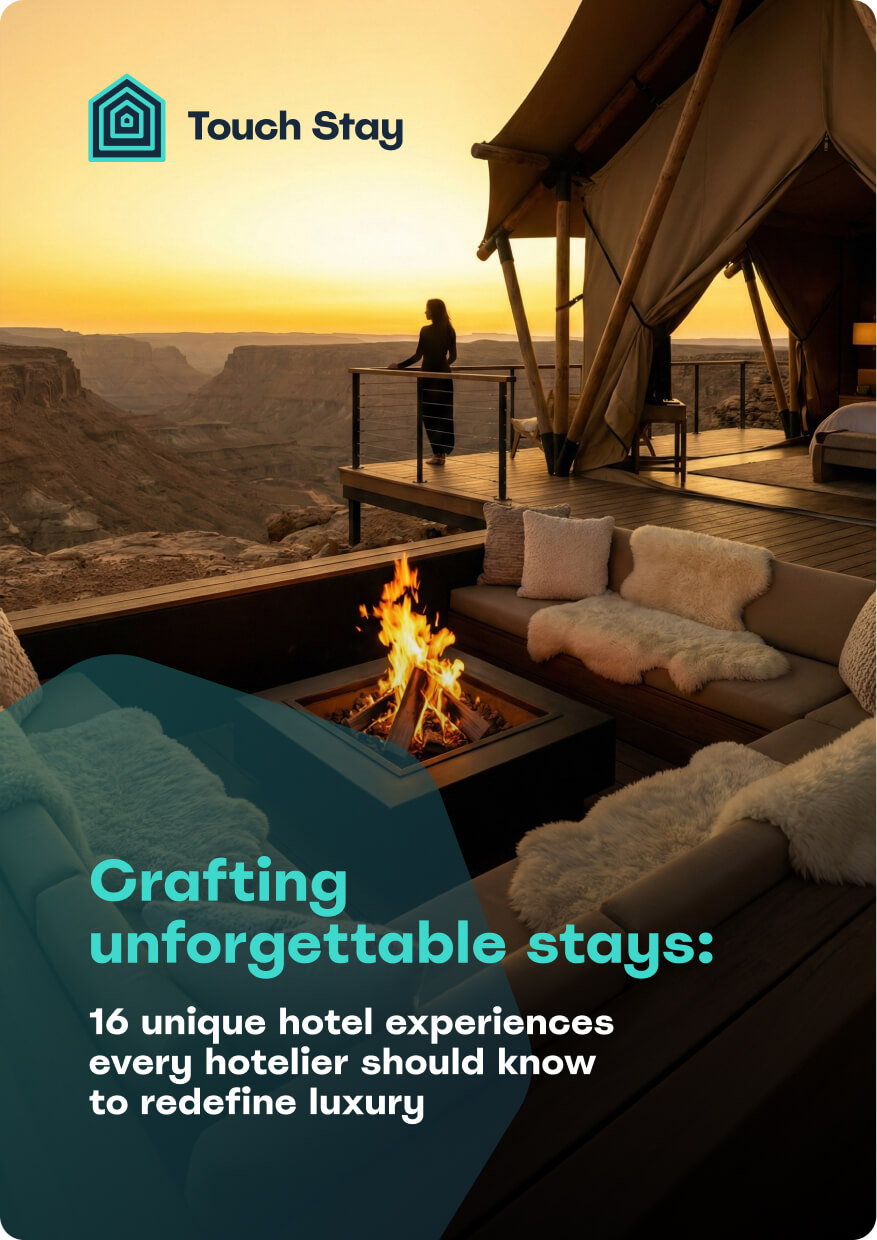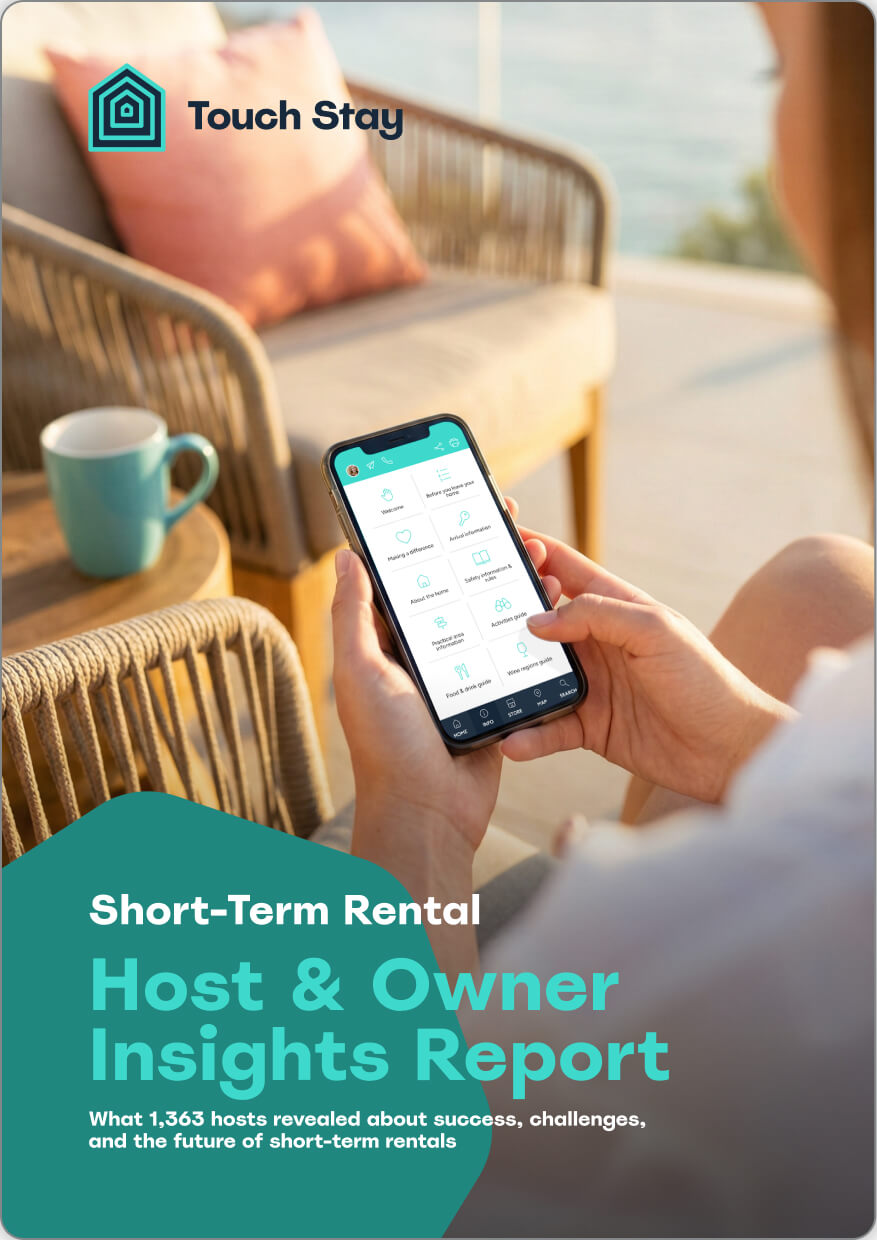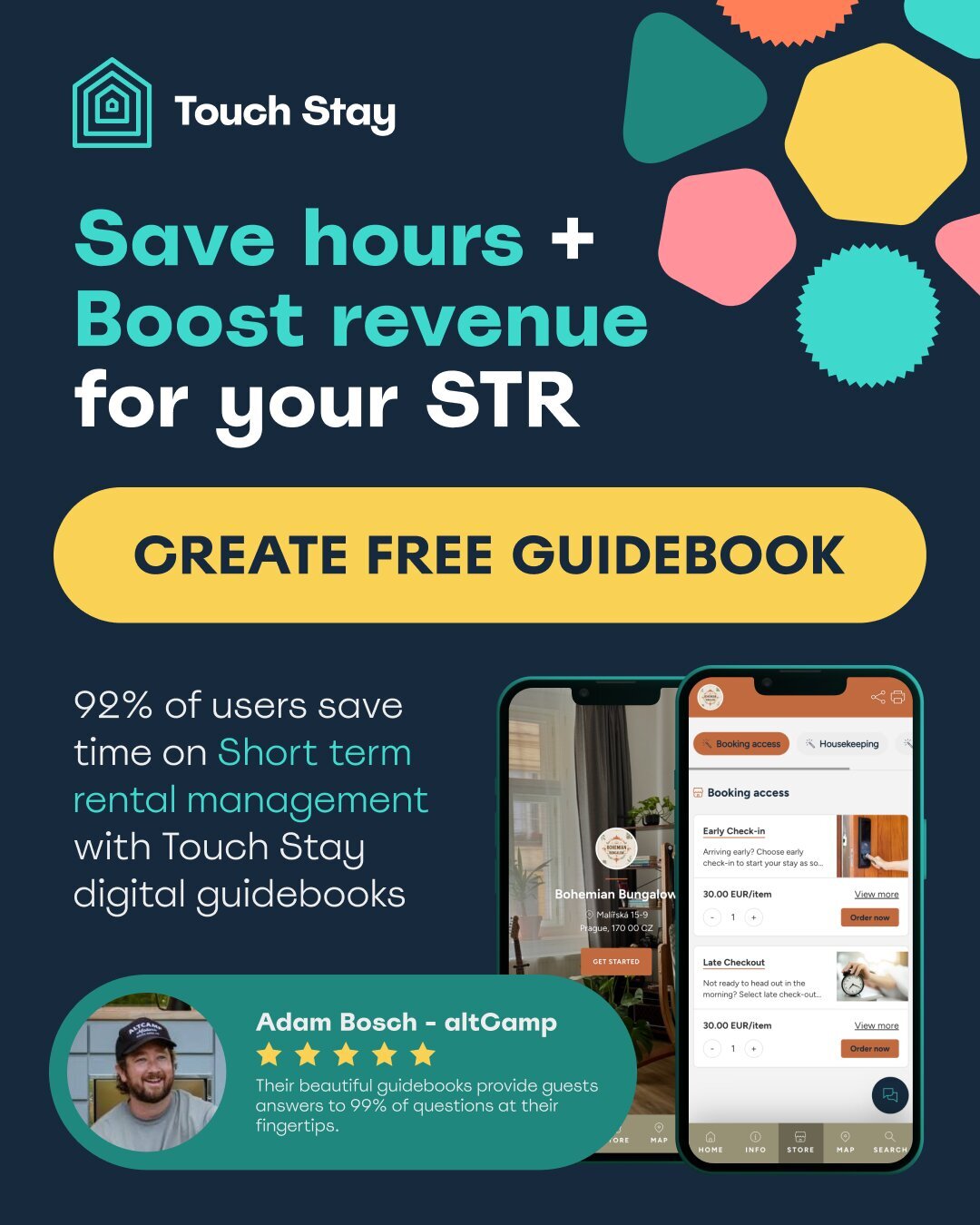Dreaming of running your own Airbnb business without owning property?
Good news: it's not only possible but potentially highly profitable.
This guide will show you how to start an Airbnb business through rental arbitrage, co-hosting and property management, offering low upfront investment and high profitability. Whether you are looking for tips on how to start up an Airbnb or seeking a profitable new venture, dive in to learn everything about entering the short-term rental market without buying property:
- How much can you make starting an Airbnb business?
- Understanding different business models
- Legal and financial considerations
- Steps to start an Airbnb business without owning property
- Tips and tricks for starting an Airbnb business
- Final thoughts
Looking to take your Airbnb to the next level?
See how a digital guidebook can enhance the guest experience and save you hours!
How much can you make starting an Airbnb business?
One of the first questions people ask when exploring how to start an Airbnb business without owning property is about the potential for profit. The earning potential in short-term rentals, especially with models like rental arbitrage, co-hosting and property management, can be substantial, but it varies significantly based on your model, location and operational efficiency.
Rental arbitrage earnings
Rental arbitrage involves leasing a property long-term and subletting it on Airbnb. The profit is the difference between your guaranteed long-term rent and your short-term rental revenue, minus all operational costs.
- Average Potential: In the UK, average Airbnb revenues can outpace average long-term rents, with one analysis suggesting an average monthly profit margin of around £561 (before cleaning costs and other expenses) for a typical listing.
- High-Performing Markets: Top tourist or business hubs like Cornwall or Edinburgh can offer significantly higher profit margins than the national average due to strong demand and high occupancy rates.
- Key Factors: Success hinges on securing a low long-term rent, achieving a high occupancy rate and having competitive nightly pricing.
Co-hosting earnings
As a co-host, you assist property owners with their listings, earning a percentage of the booking revenue. This is a low-risk way to start, as you have minimal upfront costs.
- Fee Structure: Co-hosts typically charge between 10% and 25% of the total booking revenue, depending on the scope of services provided.
- Example Income: For a property generating £25,000 annually, a co-host charging 20% would earn £5,000 a year from that single listing. By managing multiple properties, this can quickly become a full-time, scalable income.
Property management earnings
Property management is a full-scale Airbnb business that involves managing multiple properties for owners.
- Commission Rates: Management fees in the UK often range from 15% for basic services to 25% for full-service packages.
- Income Potential: Experienced property managers in major cities can earn £50,000 to £80,000 annually by scaling their portfolio. Managers are often paid a percentage of the total revenue, meaning their income grows directly with their hosts' success.
Ultimately, the earning potential is only limited by your ability to scale and deliver exceptional guest experiences.
Understanding different business models
Before diving into the steps of how to get started with Airbnb without owning property, it's crucial to understand the different business models available to you. Each model has its unique advantages and challenges, catering to different skill sets and risk appetites.
1. Rental arbitrage
Rental arbitrage involves leasing properties long-term and subletting them on Airbnb. This model can be highly profitable if executed correctly and is a popular way to start an Airbnb business.
Key considerations for rental arbitrage include:
- Obtaining legal permissions from landlords and local authorities (this is non-negotiable).
- Conducting thorough market research to ensure profitability.
- Understanding and complying with local short-term rental regulations.
💡 Pro tip: learn more with the Touch Stay Guide to Rental Arbitrage!
2. Co-hosting
Co-hosting is an excellent way to start an Airbnb business without owning property. As a co-host, you assist property owners in managing their Airbnb listings.
Responsibilities of a co-host may include:
- Managing bookings and guest communications.
- Coordinating cleaning and maintenance.
- Optimising listing details and pricing for better search ranking.
3. Property management
Property management involves managing multiple properties on behalf of owners for a fee. This model is ideal for those looking to scale their Airbnb business without owning the real estate.
To succeed in property management, you'll need:
- Comprehensive knowledge of property management practices.
- Strong organisational and multitasking abilities.
- Excellent guest service skills to keep both guests and owners happy.
Legal and financial considerations
Before you start an Airbnb business without owning property, it's crucial to address the legal and financial aspects of your venture.
Legal requirements
- Local regulations: Research and comply with local short-term rental laws. These can vary significantly between cities and even neighbourhoods and are often the biggest hurdle to overcome.
- Lease agreements: Secure explicit, written permissions from property owners or landlords if you're pursuing rental arbitrage or property management. Your landlord must be on board with the subletting plan.
Financial management
- Startup costs: Budget for initial expenses such as furniture and decor, cleaning supplies, marketing, and insurance. This is your seed money for starting the Airbnb business.
- Insurance: Obtain specialist short-term rental insurance to cover liability and potential property damage, as a standard homeowner's or renter's policy will likely not be enough.
- Revenue potential: Estimate your income by researching average nightly rates and occupancy rates throughout the year in your target area. Tools like AirDNA or Mashvisor can provide data-driven insights.
Steps to start an Airbnb business without owning property
Now that you understand the business models and key considerations, let's dive into the step-by-step process of how to start an Airbnb business without owning property.
1. Market research and strategy
Thorough market research is crucial for identifying profitable locations and understanding your target audience.
- Analyse demand, competition, and rental rates in potential areas.
- Use data-driven tools for insights into profitable niche markets.
- Study successful Airbnb listings in your target market to see what works.
2. Securing properties
Once you've identified promising locations, it's time to secure properties for your Airbnb business. This is the most challenging step in rental arbitrage or property management.
Tips for negotiating with property owners:
- Prepare a compelling business proposal highlighting the benefits of short-term rentals (e.g., higher income, professional maintenance, guaranteed income).
- Address potential concerns proactively (e.g., increased wear and tear, noise complaints).
- Offer a profit-sharing model to incentivise property owners and demonstrate a true partnership.
Want to show property owners you mean business?
Touch Stay helps you build trust from day one with a professional digital owner manual. A comprehensive, beautifully designed owner manual will provide all the answers to owners' questions upfront, creating clear lines of communication and demonstrating your commitment to professional management. This is your first major step in answering how to start an Airbnb business with a professional edge.

3. Setting up listings for success
Creating attractive and high-performing Airbnb listings is crucial for success.
Key elements of a great Airbnb listing:
- High-quality, professional photos showcasing the property's best features. Never use phone photos.
- Detailed, engaging descriptions highlighting unique selling points (USPs). Incorporate relevant keywords like "luxury city break" or "family-friendly rural escape."
- Competitive pricing based on real-time market research and property features. Use dynamic pricing tools to maximise revenue.
4. Managing your Airbnb business
Effective management is key to running a successful Airbnb business without owning the property.
- Operational efficiency: Utilise automation tools for booking management, guest communication, and dynamic pricing. Outsourcing services like professional cleaning and maintenance is essential for scaling.
- Guest experience: Providing an exceptional guest experience is crucial for positive reviews and repeat bookings, the lifeblood of any short-term rental Airbnb business. Prompt and friendly communication, and quick resolution of any issues are mandatory.
Clear, effective communication is at the heart of every successful Airbnb business.
To save significant time and streamline guest communications, join the 50,000+ properties that rely on Touch Stay. A digital guidebook will save you hours by reducing repetitive guest questions.

5. Marketing and growing your business
To stand out in the competitive Airbnb market, you'll need effective marketing strategies.
- Build a strong online presence: Create a dedicated website for your Airbnb business (even a simple one) and leverage social media platforms to showcase your properties and local area.
- SEO Optimisation: Optimise your listing title and description with relevant search terms to rank well for guests searching for terms like "holiday home with parking" or "short stay London flat."
Tips and tricks for starting an Airbnb business
To help you successfully launch your short-term rental venture, here are 10 practical tips for how to start an Airbnb business without owning property and make it a profitable, scalable enterprise.
1. Specialise in a niche market
Focusing on a specific niche, such as business travel, pet-friendly stays, or luxury weekend retreats, allows you to tailor your property and marketing to a high-demand, less-saturated audience. This differentiation is critical to standing out and commanding higher nightly rates, increasing your profit margins.
2. Master the landlord pitch
For rental arbitrage, your pitch is everything. Instead of simply asking to sublet, present a professional business plan that shows the landlord you are a reliable, corporate-style tenant who will guarantee rent, professionally maintain the property, and provide higher-grade insurance. This drastically reduces their perceived risk.
3. Use professional photography and staging
High-quality, professional photos are the single most important factor in driving bookings. Invest in a professional photographer and stage the property to highlight its best features. This directly impacts your click-through rate, which in turn boosts your ranking for key search terms like how to start an Airbnb business efficiently.
💡 Pro tip: check out our guide to getting professional Airbnb photos
4. Implement dynamic pricing from day one
Do not use a fixed price. Use a dynamic pricing tool that automatically adjusts your nightly rate based on seasonality, local events, day of the week, and competitor prices. This maximises your revenue during peak times and keeps occupancy high during slower periods.
5. Prioritise a seamless check-in process
A smooth, easy, and secure check-in is the foundation of a 5-star review. Use smart locks and clear, automated instructions for a self-check-in process. This saves you time and reduces guest frustration, contributing significantly to a positive guest experience.
6. Create a professional digital guidebook with a service like Touch Stay
A high-quality digital guidebook is a non-negotiable tool for professional hosts. It reduces 80% questions guests ask by putting all property information (Wi-Fi codes, local recommendations, house rules, etc.) in one easily accessible app.
This saves you time and significantly enhances the guest experience!
7. Build a network of reliable local service providers
You cannot manage an Airbnb business alone. Establish strong relationships with a reliable cleaning crew, a handyman, and an emergency plumber who can respond quickly to issues, even late at night. Their reliability directly affects your guest reviews and long-term success.
8. Automate guest communication
Use pre-written templates and scheduling software for all routine guest communications: booking confirmation, pre-check-in, check-in instructions, check-out reminder, and review request. This ensures quick response times, which Airbnb rewards with better search visibility.
9. Secure the right insurance coverage
Do not rely solely on Airbnb's Host Guarantee or Host Protection Insurance. Purchase a dedicated commercial short-term rental insurance policy that covers liability, loss of income, and property damage caused by guests. This is a critical business safeguard.
10. Stay compliant with local laws and tax obligations
Local regulations can change quickly. Continuously monitor local short-term rental laws, including licensing requirements, tax obligations (like VAT/GST), and length-of-stay restrictions. Non-compliance is the fastest way to shut down your Airbnb business.
Final thoughts on how to start an Airbnb business
Starting an Airbnb business without owning property is an exciting opportunity that offers flexibility and potential for significant profits. By understanding the various business models, conducting thorough research, and focusing on operational excellence and guest satisfaction, you can build a successful Airbnb empire without the need for substantial upfront investment.
Remember, success in this industry requires dedication, adaptability, and a commitment to providing exceptional experiences for your guests. Whether you choose rental arbitrage, co-hosting, or property management, the key is to start small, learn from your experiences, and gradually scale your Airbnb business.
Looking to take your Airbnb to the next level?
See how a digital guidebook can enhance the guest experience and save you hours!

Ned
Ned has clocked up over 11 years in digital marketing and comms, with a strong focus on creating engaging content for a range of brands and agencies. When he’s not writing, he can be found digging for records, peering through his telescope at the night sky, or onboard his local lifeboat where he volunteers as a crewmember.
Be the first to know!
Join our newsletter for early access to:
- ✅ Free guides
- ✅ Pro tips & tricks
- ✅ Time saving tutorials
- ✅ Latest blog posts
- ✅ Checklists & templates






















